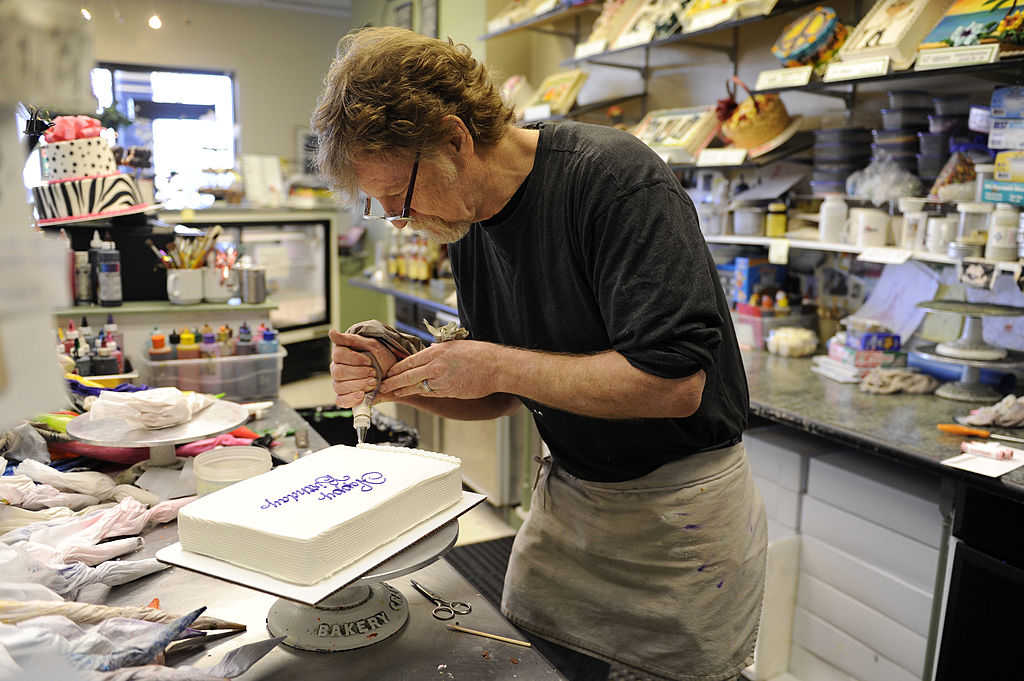The widely anticipated Supreme Court decision in the Masterpiece Cake Shop case has finally been handed down, and while only two justices dissented the decision is being described as a “narrow” one.
The justices voted 7-2 in favor of Jack Phillips and his claim that forcing him to bake a cake would violate his religious beliefs.
Here’s why it’s being described as narrow:
https://twitter.com/WorldOfStu/status/1003648770360397826
This is a good win for Phillips. I wouldn't necessarily call it a win for the First Amendment. It seems the court punted on the First Amendment question. The LGBT lobby will continue to target Christian business owners and I would expect such attacks to only increase now.
— Matt Walsh (@MattWalshBlog) June 4, 2018
It's great to see the gay couple in the case lose. Their behavior was truly vindictive, vile, and despicable. They are the bullies here and they deserve to lose and be embarrassed.
— Matt Walsh (@MattWalshBlog) June 4, 2018
Narrow refers to the legal precedent it sets https://t.co/2mMIotYCM9
— Matt Walsh (@MattWalshBlog) June 4, 2018
So, while it’s a big win for Phillips and certainly better than a loss, the ruling didn’t quite become the standard for all future similar legal cases. Media headlines describing “narrow” are technically correct, but not being explained well and leaving the impression that this was a close ruling. It wasn’t, but the legal precedent it sets was.
Justice Kennedy delivered the opinion of the court:
“Whatever the confluence of speech and free exercise principles might be in some cases, the Colorado Civil Rights Commission’s consideration of this case was inconsistent with the State’s obligation of religious neutrality. The reason and motive for the baker’s refusal were based on his sincere religious beliefs and convictions. The Court’s precedents make clear that the baker, in his capacity as the owner of a business serving the public, might have his right to the free exercise of religion limited by generally applicable laws,” he wrote.
“Still, the delicate question of when the free exercise of his religion must yield to an otherwise valid exercise of state power needed to be determined in an adjudication in which religious hostility on the part of the State itself would not be a factor in the balance the State sought to reach. That requirement, however, was not met here. When the Colorado Civil Rights Commission considered this case, it did not do so with the religious neutrality that the Constitution requires. Given all these considerations, it is proper to hold that whatever the outcome of some future controversy involving facts similar to these, the Commission’s actions here violated the Free Exercise Clause; and its order must be set aside.”
You can read the full opinion of the court HERE.
The decision has been a long time coming.
Phillips, much like Oregon bakers Aaron and Melissa Klein and numerous other wedding venders across the U.S., has found himself in the crosshairs of the government as well as LGBTQ activists after declining in 2012 to make a wedding cake for a same-sex couple.
Phillips has been locked in a tough legal battle with the Colorado Civil Rights Commission for the past five years. The agency ruled that his cake refusal was in violation of anti-discrimination laws and punished him accordingly.
According to his attorneys with the Alliance Defending Freedom, a conservative legal firm, Phillips was forced to engage in “re-educating his staff and filing quarterly ‘compliance’ reports for two years.”
The baker’s legal battle first touched off in July 2012 when couple Charlie Craig and David Mullins approached him to make a cake for their same-sex ceremony and he “politely declined.” The couple filed a complaint with the state’s civil rights commission and are now represented by the American Civil Liberties Union.
Phillips asked the Supreme Court to take up his case after the Colorado Supreme Court declined to do so last April and after the Colorado Court of Appeals backed the civil rights commission’s discrimination determination, as Deseret News reported.
Attorneys for Phillips argued that no American should be forced to use creative or artistic expression if doing so violates his or her conscience, as this baker has claimed it does.
Phillips said his opposition is based on his biblical view of marriage, with the baker proclaiming that he would similarly reject cakes with “offensive written messages and cakes celebrating events or ideas that violate his beliefs, including cakes celebrating Halloween, anti-American or anti-family themes, atheism, racism, or indecency,” as previously reported.
“No one — not Jack or anyone else — should be forced by the government to further a message that they cannot in good conscience promote,” Alliance Defending Freedom senior counsel Jeremy Tedesco said in a statement. “And that’s what this case is about.”
But Ria Tabacco Mar, an ACLU attorney who represents Charlie Craig and David Mullins, said that the case surrounds Phillips refusal to sell certain products to homosexual couples that he sells to heterosexual couples (i.e. the wedding cake). Mar said the equal protection clauseunder the 14th Amendment trumps the First Amendment in public accommodations cases.
“We all have a right to our personal beliefs, but we do not have a right to impose those beliefs on others and harm them,” Mar said in a statement issued last year.
The two sides hold very different views on the matter, with Phillips suspending all wedding cake orders back in 2014 to avoid any fines or further legal proceedings.



